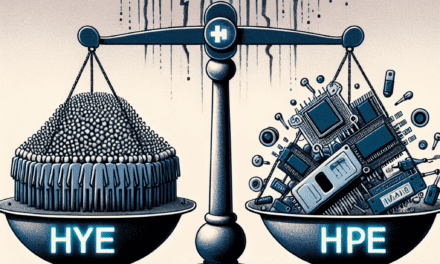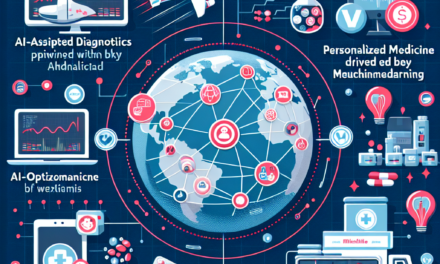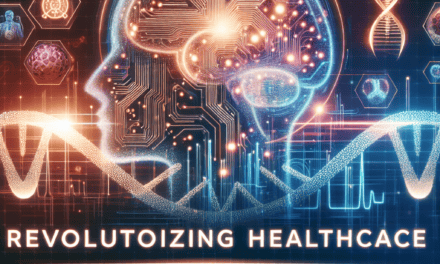AI Innovations Propel Health Systems Towards Their Goals
The healthcare industry is undergoing a transformative shift, driven by the rapid advancements in artificial intelligence (AI). As health systems strive to improve patient outcomes, enhance operational efficiency, and reduce costs, AI innovations are emerging as powerful tools that can help achieve these objectives. This article explores how AI is revolutionizing healthcare through five key subtopics: predictive analytics, personalized medicine, operational efficiency, patient engagement, and ethical considerations in AI deployment.
Predictive Analytics: Anticipating Patient Needs
Predictive analytics in healthcare involves using historical data, machine learning algorithms, and statistical techniques to forecast future patient outcomes. This innovative approach allows healthcare providers to anticipate patient needs, improve clinical decision-making, and allocate resources more effectively.
One of the most significant applications of predictive analytics is in the management of chronic diseases. For instance, AI algorithms can analyze patient data to identify those at high risk of complications from conditions such as diabetes or heart disease. By flagging these patients early, healthcare providers can intervene proactively, offering tailored treatment plans and lifestyle modifications that can prevent hospitalizations.
- Case Study: Mount Sinai Health System – Mount Sinai implemented a predictive analytics model that analyzes electronic health records (EHR) to identify patients at risk of readmission. The model has successfully reduced readmission rates by 20%, demonstrating the power of AI in improving patient outcomes.
- Emergency Room Optimization – AI can predict patient inflow in emergency departments, allowing hospitals to optimize staffing and resource allocation. By analyzing historical data, hospitals can prepare for peak times, reducing wait times and improving patient satisfaction.
- Population Health Management – Predictive analytics can help identify health trends within specific populations, enabling targeted interventions. For example, AI can analyze social determinants of health to identify communities at risk for certain diseases, guiding public health initiatives.
Moreover, predictive analytics can enhance clinical trials by identifying suitable candidates based on genetic and demographic data. This not only accelerates the research process but also ensures that trials are more representative of the general population, leading to more effective treatments.
In summary, predictive analytics is a game-changer in healthcare, enabling providers to anticipate patient needs and improve outcomes through data-driven decision-making.
Personalized Medicine: Tailoring Treatments to Individuals
Personalized medicine, often referred to as precision medicine, leverages AI to tailor medical treatments to individual patients based on their unique genetic makeup, lifestyle, and environmental factors. This approach moves away from the traditional “one-size-fits-all” model, allowing for more effective and targeted therapies.
AI plays a crucial role in analyzing vast amounts of genomic data to identify mutations and biomarkers associated with specific diseases. For example, in oncology, AI algorithms can analyze tumor samples to determine the most effective treatment options for individual patients, significantly improving survival rates.
- Case Study: IBM Watson for Oncology – IBM Watson uses AI to analyze patient data and medical literature to recommend personalized treatment options for cancer patients. In clinical trials, Watson has demonstrated an accuracy rate of over 90% in recommending treatment plans that align with expert oncologists.
- Pharmacogenomics – AI can analyze genetic data to predict how patients will respond to certain medications. This information allows healthcare providers to prescribe drugs that are more likely to be effective and have fewer side effects, enhancing patient safety and treatment efficacy.
- Chronic Disease Management – Personalized medicine extends to chronic disease management, where AI can analyze lifestyle data (such as diet and exercise) to create individualized care plans that improve patient adherence and outcomes.
The integration of AI in personalized medicine not only enhances treatment efficacy but also empowers patients by involving them in their care decisions. Patients can receive tailored recommendations that align with their preferences and values, leading to improved satisfaction and adherence to treatment plans.
In conclusion, personalized medicine powered by AI is revolutionizing how healthcare providers approach treatment, leading to better outcomes and a more patient-centered approach.
Operational Efficiency: Streamlining Healthcare Processes
Operational efficiency is critical for healthcare systems aiming to reduce costs and improve service delivery. AI innovations are streamlining various processes, from administrative tasks to clinical workflows, allowing healthcare providers to focus more on patient care.
One of the most significant areas where AI is making an impact is in administrative tasks. AI-powered chatbots and virtual assistants can handle routine inquiries, appointment scheduling, and patient follow-ups, freeing up staff to focus on more complex tasks. This not only improves efficiency but also enhances the patient experience by providing timely responses to inquiries.
- Case Study: Mayo Clinic – Mayo Clinic implemented an AI-driven scheduling system that optimizes appointment bookings based on patient needs and provider availability. This system has reduced scheduling errors by 30% and improved patient satisfaction scores.
- Telemedicine and AI – The rise of telemedicine has been accelerated by AI technologies that facilitate remote consultations. AI can analyze patient data during virtual visits, providing clinicians with real-time insights that enhance decision-making.
- Supply Chain Management – AI can optimize supply chain operations by predicting inventory needs based on patient volume and historical data. This reduces waste and ensures that essential medical supplies are always available.
Furthermore, AI can enhance clinical workflows by automating documentation processes. Natural language processing (NLP) technologies can transcribe and summarize patient encounters, allowing clinicians to spend more time with patients rather than on paperwork. This not only improves job satisfaction for healthcare providers but also enhances the quality of care delivered to patients.
In summary, AI innovations are significantly improving operational efficiency in healthcare systems, allowing providers to streamline processes, reduce costs, and enhance the overall patient experience.
Patient Engagement: Empowering Individuals in Their Health Journey
Patient engagement is a critical component of effective healthcare delivery. Engaged patients are more likely to adhere to treatment plans, attend follow-up appointments, and maintain open communication with their healthcare providers. AI technologies are playing a pivotal role in enhancing patient engagement through personalized communication and support.
AI-driven applications can provide patients with tailored health information, reminders for medication adherence, and educational resources that empower them to take an active role in their health. For instance, mobile health (mHealth) applications can use AI algorithms to analyze user data and provide personalized recommendations for lifestyle changes, such as diet and exercise.
- Case Study: MySugr – MySugr is a diabetes management app that uses AI to provide personalized insights and recommendations based on user data. The app has been shown to improve glycemic control in users by promoting better self-management practices.
- Remote Monitoring – AI-powered remote monitoring devices can track patient vitals and alert healthcare providers to any concerning changes. This proactive approach allows for timely interventions and fosters a sense of security for patients.
- Social Media and AI – AI can analyze social media interactions to gauge patient sentiment and identify common concerns. This information can help healthcare providers tailor their communication strategies and address patient needs more effectively.
Moreover, AI can facilitate peer support networks by connecting patients with similar conditions. These networks can provide emotional support and practical advice, enhancing the overall patient experience and promoting adherence to treatment plans.
In conclusion, AI innovations are empowering patients to take charge of their health, leading to improved engagement, better health outcomes, and a more collaborative relationship between patients and healthcare providers.
Ethical Considerations in AI Deployment: Navigating Challenges
While the potential benefits of AI in healthcare are immense, the deployment of these technologies raises important ethical considerations that must be addressed. Issues such as data privacy, algorithmic bias, and the potential for job displacement are critical factors that healthcare systems must navigate as they integrate AI into their operations.
Data privacy is a paramount concern in healthcare, where sensitive patient information is often involved. Healthcare providers must ensure that AI systems comply with regulations such as the Health Insurance Portability and Accountability Act (HIPAA) in the United States. This includes implementing robust data security measures and obtaining informed consent from patients regarding the use of their data.
- Algorithmic Bias – AI algorithms can inadvertently perpetuate biases present in the training data. For example, if an AI system is trained primarily on data from a specific demographic group, it may not perform well for patients outside that group. Healthcare systems must prioritize diversity in their data sets to ensure equitable care.
- Transparency and Accountability – As AI systems make more clinical decisions, the need for transparency becomes critical. Healthcare providers must be able to explain how AI algorithms arrive at their recommendations to maintain trust with patients and clinicians.
- Job Displacement Concerns – The automation of certain tasks through AI may lead to concerns about job displacement among healthcare workers. It is essential for healthcare systems to approach AI integration thoughtfully, focusing on augmenting human capabilities rather than replacing them.
To address these ethical challenges, healthcare organizations should establish clear guidelines for AI deployment, prioritize ongoing training for staff, and engage in open dialogue with patients about the use of AI in their care. By fostering a culture of ethical AI use, healthcare systems can harness the benefits of these technologies while minimizing potential risks.
In summary, while AI innovations hold great promise for transforming healthcare, it is crucial to navigate the ethical considerations associated with their deployment to ensure that all patients receive equitable and high-quality care.
Conclusion: The Future of Healthcare with AI Innovations
AI innovations are propelling health systems towards their goals by enhancing predictive analytics, personalizing medicine, improving operational efficiency, engaging patients, and addressing ethical considerations. As healthcare continues to evolve, the integration of AI technologies will play a pivotal role in shaping the future of patient care.
By leveraging AI, healthcare providers can anticipate patient needs, tailor treatments to individuals, streamline processes, empower patients, and navigate the ethical landscape of technology deployment. The successful implementation of AI in healthcare requires collaboration among stakeholders, including clinicians, technologists, policymakers, and patients.
As we look ahead, it is clear that AI will be a cornerstone of healthcare innovation, driving improvements in patient outcomes, operational efficiency, and overall health system performance. Embracing these technologies while addressing the associated challenges will be essential for creating a more effective, equitable, and patient-centered healthcare system.





